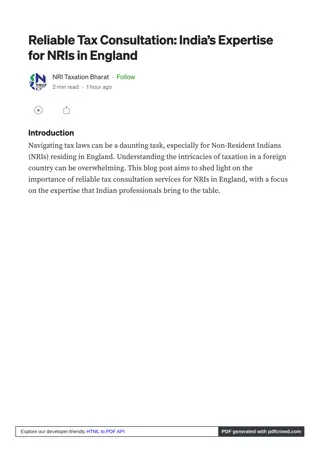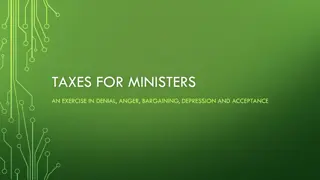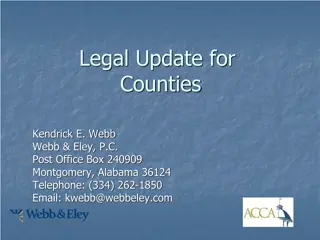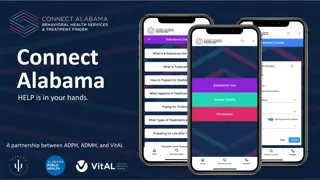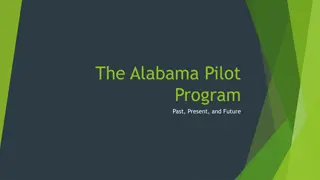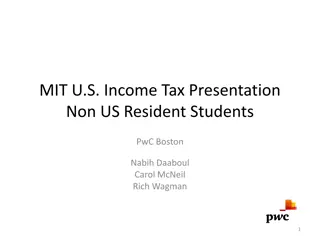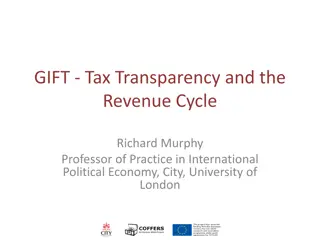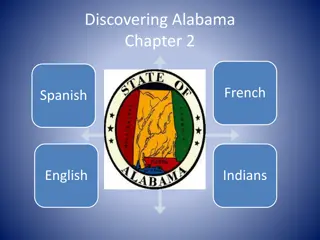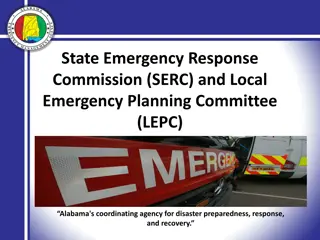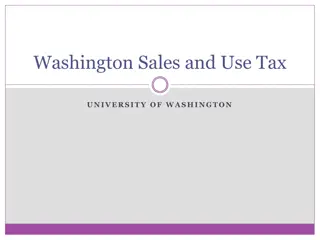Alabama's Simplified Sellers Use Tax Program Overview
Alabama's Simplified Sellers Use Tax Program was introduced as a response to changing consumer trends and online sales, aiming to level the playing field for local retailers. The program, active since 2015, requires eligible sellers to collect and remit an 8% tax, providing a streamlined process with incentives for participants. Federal legislation, U.S. Supreme Court opinions, and state responses have shaped the evolution of this program, emphasizing the need for tax reform in the digital age.
Uploaded on Sep 20, 2024 | 1 Views
Download Presentation

Please find below an Image/Link to download the presentation.
The content on the website is provided AS IS for your information and personal use only. It may not be sold, licensed, or shared on other websites without obtaining consent from the author.If you encounter any issues during the download, it is possible that the publisher has removed the file from their server.
You are allowed to download the files provided on this website for personal or commercial use, subject to the condition that they are used lawfully. All files are the property of their respective owners.
The content on the website is provided AS IS for your information and personal use only. It may not be sold, licensed, or shared on other websites without obtaining consent from the author.
E N D
Presentation Transcript
Alabamas Simplified Sellers Use Tax Joe Garrett, Deputy Commissioner Alabama Department of Revenue
Alabamas Experience Where we were 2015: Bentley administration identified remote sales/use tax collection as a priority. Raises revenue without raising taxes. Traditional sales tax base is eroding. Local brick and mortar retailers, some of our most important partners in the tax collection process, are suffering at the hands of online and untaxed competition. Congressional inaction.
Federal Legislation Since 2005, the following bills have been introduced in Congress: Main Street Fairness Act (MSFA) Marketplace Equity Act (MEA) Marketplace Fairness Act (MFA) Remote Transaction Parity Act (RTPA) Online Sales Simplification Act (Goodlatte Proposal) States decide to take action into their own hands after MFA passes the Senate in 2013 only to die in House (Goodlatte s committee)
U.S. Supreme Court - Justice Kennedy Opines Justice Kennedy s Concurrence in DMA v. Brohl (2015): Given these changes in technology and consumer sophistication, it is unwise to delay any longer a reconsideration of the Court s holding in Quill. A case questionable even when decided, Quill now harms States to a degree far greater than could have been anticipated earlier. The legal system should find an appropriate case for this Court to reexamine Quill and Bellas Hess. On January 20, 2016, the National Conference of State Legislatures issued a letter to state legislatures urging them to act to expand statutory authority to collect sales tax.
Alabamas Response Department s Response to Kennedy s Concurrence in DMA Simplified Sellers Use Tax Program Enacted in 2015 Program active in October 2015 with first remittance in November 2015 Amended in 2016 Economic Nexus Rule for Large Remote Sellers
Simplified Sellers Use Tax Remittance Program Act 2015-448 Simplified Sellers Use Tax Remittance Act Effective October 1, 2015 Eligible seller collects, reports and remits a flat 8 percent tax Regardless of where shipped w/n Alabama No additional sales or use tax due on the transaction Two percent discount for participants Participation Voluntary Seller required to identify tax as SSUT on invoice Single return, single audit
Simplified Sellers Use Tax Remittance Act Act 2016-110 Updates to Simplified Sellers Use Program Updates to definition of an Eligible Seller An eligible seller may remain in the program provided they were a participant for at least 6 months prior to establishing a physical presence or filing obligation unless the seller establishes a physical present through a physical business address for the purpose of making instate retail sales or establishes a presence through an affiliate making sales at a physical business address in Alabama. Updates Federal Enforceability. Updates to allow continued participation of eligible sellers in the program unless federal legislation removes current federal limitations on the ability of the Department to enforce its sales and use tax jurisdiction on businesses that lack an instate physical presence. SSUT Program repositioned Alabama from being one of the most difficult states for remote sales tax collection to one of the easiest.
The Success of Alabamas Simplified System Amazon Amazon started collecting the simplified sellers use tax effective November 1, 2016. First collections due December 20, 2016. Motivated by a combination of our new simple system, the economic nexus rule and Amazon s expanding footprint. Amazon generated over $107 billion in sales in 2015.
The Success of Alabamas Simplified System 78 remote sellers participating in the program. 118 applicants to date - 75 approved/ 39 denied/1 no longer eligible due to nexus Total revenue collected through the program to date (November collection period): $5,813,679 Agreements have been reached with several large remote sellers that are participating in the program. While we are moving forward with litigation to overturn Quill, we ve already achieved significant compliance with remote sales tax collection because of the success of our simplified system and our regulation.
The Success of Alabamas Simplified System FY 2016 Collections 1stQuarter (Oct Dec 15) 2ndQuarter (Jan March 16) $469,600.51 3rdQuarter (April June 16) $1,807,306.37 4thQuarter (July Sept 16) Total $4,365,240.73 $12,570.77 $2,075,763.08 FY 2017 Collections 1stQuarter October 2016 $696,948.41 November 2016 $751,489.98
Alabamas Sales Tax Economic Nexus Regulation Rule 810-6-2-.90.03 Requirements for Certain Out-of-State Sellers Making Significant Sales into Alabama. Effective January 1, 2016 Out-of-state sellers who lack an Alabama physical presence but who are making retail sales of tangible personal property (TPP) into the state have a substantial economic presence in Alabama for sales and use tax purposes and are required to register and collect and remit tax when seller s retail sales of TPP sold into state exceed $250,000 per year based on the previous calendar year s sales. Remote seller may comply with rule by participating in the Simplified Sellers Use Tax Remittance Program.
Alabama Litigation Newegg Inc., v. Magee. Docket # S.16-613 Filed June 9, 2016 with the Alabama Tax Tribunal. Challenges the constitutionality of the Alabama economic nexus rule Taxpayer argues both that: It did not and does not have the necessary physical presence in Alabama to satisfy substantial nexus standard. Rule 810-6-2-.90.03 conflicts with sales and use tax imposition statutes.
Thank you Joe Garrett, Deputy Commissioner Alabama Department of Revenue
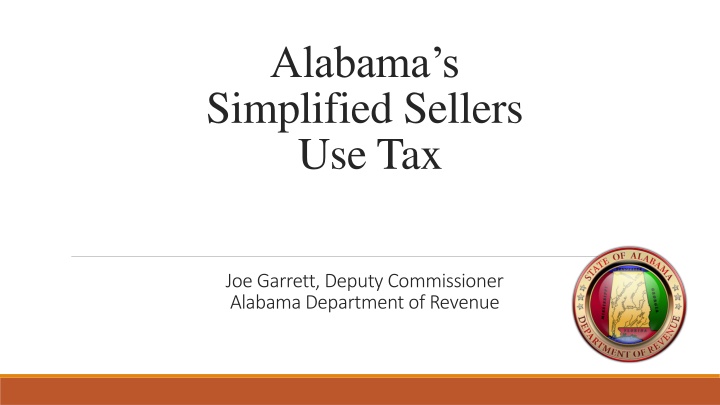

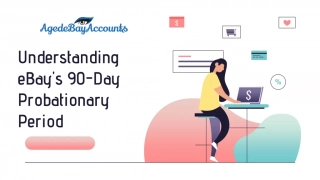
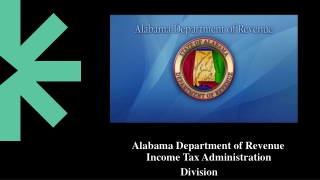


![Town of [Town Name] Real Estate Tax Rates and FY 2024 Budget Summary](/thumb/62211/town-of-town-name-real-estate-tax-rates-and-fy-2024-budget-summary.jpg)
